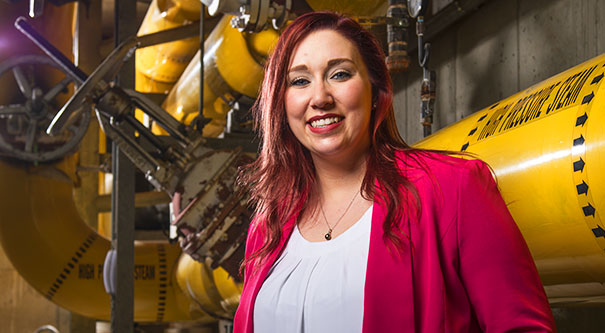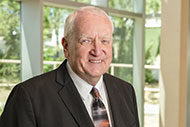In a field traditionally dominated by older males, Brittany Remec, manager of building maintenance at Loyola University Medical Center, Maywood, Ill., breaks the mold. This month, she talks about her rewarding career, launched with invaluable assistance from the American Society for Healthcare Engineering (ASHE).
What are your responsibilities as building maintenance manager at Loyola University Medical Center?
I manage the painters, plumbers, maintenance mechanics, carpenter and locksmiths. I also have an assistant supervisor who reports to me. In addition to the personnel management, I maintain the roofing repairs and our room refresh program.
We have an aging infrastructure, to which most facility managers can relate, so we have a few emergencies now and then. I’m usually the one to manage the remediation of any emergencies we may have.
Why did you decide to pursue health care facility management as a career?
I stumbled upon this wonderful field by accident. My degree is in building construction management from Purdue University, Lafayette, Ind., which required 800 hours of internships.
After my second year in school, I still had not had an internship when my counselor told me about one sponsored by ASHE. She assisted me in getting placed and that’s where my career started.
I had no idea what I was getting into when I started. I completed two summers interning at a suburban Chicago hospital and then a summer interning with a Chicago area network of hospitals. At each internship, I developed great relationships with my mentors, all of whom recently attended my wedding. I currently work for my mentor from my first internship.
Also, at Purdue you can specialize in certain areas in the building construction management program. For example, I narrowed my choices to disaster restoration or health care construction. For me, these two specializations seemed the most rewarding.
I believed getting into either specialty would create a sense of pride when a job was completed. You can look back at how grateful the customer is about the work when it’s finished.
The Remec File |
| CV • Manager of building maintenance at Loyola University Medical Center, Maywood, Ill. ACCOMPLISHMENTS • Membership committee chairwoman at the Healthcare Engineering Society of Northern Illinois EDUCATION • Bachelor of science degree in building construction management technology with a specialization in health care construction from Purdue University, West Lafayette, Ind. |
Why do you think we don’t see more women in health facilities management?
A large number of those in the field came up through the building trades or the armed services. For example, one of my mentors entered the field after being in the U.S. Coast Guard. Another started as an HVAC technician.
I feel that times have changed and, hopefully, we will start to see more women in this field. As a professor told me when I was touring Purdue, "Women see things men don’t. We need more women in this field."
What do you like best about working in health care facility management?
I have always said that my job is amazing because every day is different. I never have two days that are the same and that makes coming to work exciting and interesting.
When I started in my program at Purdue, I had no idea what it meant for me. After my first summer in facilities management, I knew that this is what I wanted to do for a living. A lot of people do not realize what it takes to keep a hospital running. Once I found out, I was hooked.
Have you encountered challenges in being a woman in a male-dominated field?
Being a woman in a male-dominated field has presented its challenges. I actually had someone tell me I belonged in the kitchen and not in the boiler room. But I would say that more than being a woman, my [younger] age has proven difficult.
As I said earlier, a large number of people in this field came through the trades or armed services. I entered from college, not the trades. I’ve never had to turn a wrench or change filters. In other words, I haven’t earned my stripes in the traditional way.
I am always open and honest about my experiences and my knowledge. If I don’t understand, I ask. I think this has created a different kind of respect with my team. I am early in my career and I know I have a lot more learning to do.
You joined the student chapter of ASHE at Purdue University. How did ASHE help in starting your career?
ASHE was more than instrumental in launching my career. I’ve said it before and will say it again that I wouldn’t be where I am today without ASHE, which sponsored my internships. The organization took a chance on me and I will be forever grateful for that.
Without ASHE, I never would have met my amazing mentors. I never would have been able to work with some of the incredibly intelligent people in this field with whom I’ve had the pleasure of working. I was exposed to a lot of professionals who have helped me along the way.
Do you have any advice for young people who are thinking about starting a career as a health care facility professional?
Complete as many internships as you can — I recommend that for any field. Also, attending conferences and professional organization meetings is the best way to network. Networking is key in health care facilities management.
If not for the ASHE annual conferences, I would not have had the opportunity to meet other interns and mentors from other organizations. These are relationships to maintain. They could be key down the road.
How are you helping ASHE to recruit young people to enter the field?
I sit on the ASHE Education Advisory Committee where I’m leading a task force to create an entry-level designation to help people right out of a college program to become employed.
Some organizations do not want to take a chance on a young person out of college. They prefer the seasoned engineer who knows his or her way around a boiler plant. This designation would show that through schooling and testing via ASHE, they are qualified to be an entry-level facility manager.
I feel strongly about this because it took me three months to get a job after I graduated, despite all the connections I had made through my internships. No one wanted to take a chance on a young woman with no real field experience.
What are your career goals and how do you plan to achieve them?
I qualify to take the Certified Healthcare Facilities Manager exam this summer. I also would like to get my master’s degree in business administration in the next couple of years.
I think these would help me tremendously in advancing my career, though I am happy with the position I’m in right now. I think that I am in a good spot to gain the experience I need to be a facility director some day.
Jeff Ferenc is a senior editor at Health Facilities Management.






